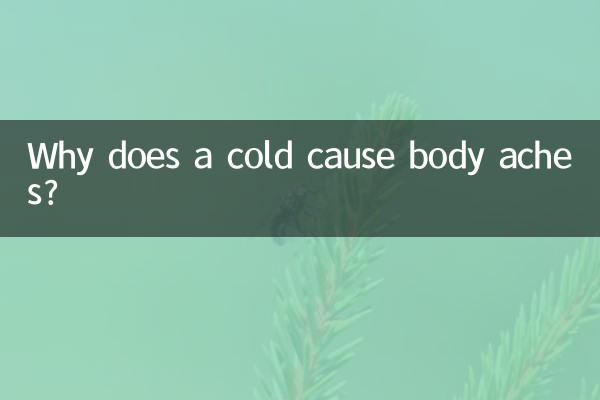Why does a cold cause body aches?
The cold is a common respiratory disease, usually caused by viruses, with symptoms including nasal congestion, cough, sore throat, etc. However, many people also experience body aches and pains when they have a cold, and the discomfort is often unbearable. So, why does a cold cause body aches? This article will analyze this phenomenon in detail for you based on hot topics and hot content in the past 10 days.
1. Causes of body aches caused by colds

The body aches and pains caused by a cold are primarily related to the immune system's response and the direct impact of the virus. Here are the specific reasons:
| Reason | Detailed description |
|---|---|
| immune system response | When a virus invades the human body, the immune system releases a large number of inflammatory mediators (such as prostaglandins, cytokines, etc.). These substances can stimulate nerve endings and cause pain. |
| muscle fatigue | When you have a cold, your body uses a lot of energy to fight the virus, causing a lack of muscle energy and causing soreness. |
| dehydration | Symptoms such as fever and sweating may occur during a cold, leading to loss of water in the body and electrolyte imbalance, which can lead to muscle soreness. |
| direct effect of virus | Certain viruses, such as influenza, invade muscle tissue directly, causing muscle inflammation and pain. |
2. Research on hot topics related to colds in the past 10 days
Based on hot Internet content in the past 10 days, the following is the latest research and discussion on colds and body aches:
| hot topics | Main content |
|---|---|
| The relationship between the immune system and pain | The latest research shows that cytokines (such as IL-6, TNF-α) released by the immune system are not only markers of inflammation, but also directly act on the nervous system, causing pain throughout the body. |
| Cold medicine side effects | Some cold medicines, such as those containing pseudoephedrine, may worsen dehydration, which can worsen muscle soreness. |
| The difference between influenza and common cold | The body aches and pains caused by the flu virus are usually more severe and accompanied by a high fever, whereas the aches and pains of a common cold are milder. |
| Cold and soreness from a traditional Chinese medicine perspective | Traditional Chinese medicine believes that the soreness caused by colds is related to "exogenous wind-cold". Cold air invades the meridians, causing qi and blood to not flow smoothly, causing pain. |
3. How to relieve body aches caused by colds
For body aches caused by colds, you can take the following measures to relieve discomfort:
| Mitigation methods | Specific operations |
|---|---|
| drink more water | Replenishing fluids can help dilute inflammatory mediators and relieve pain. |
| Get proper rest | Reduce physical exertion and help the immune system focus on fighting viruses. |
| take painkillers | Nonsteroidal anti-inflammatory drugs (such as ibuprofen) inhibit prostaglandin synthesis and reduce pain. |
| Apply heat or massage | Promote local blood circulation and relieve muscle tension and soreness. |
| Supplement electrolytes | Drinking electrolyte-containing beverages, such as sports drinks, can correct electrolyte imbalances caused by dehydration. |
4. Summary
The body aches and pains caused by a cold are the result of a combination of factors including the immune system's response, the direct effects of the virus, and the body's energy expenditure. By understanding these mechanisms, we can more targeted relief of discomfort. At the same time, recent popular research shows that the relationship between the immune system and pain is one of the current hot spots in medical research, and more targeted treatments may be available in the future.
If you experience severe body aches or persistent high fever during a cold, it is recommended to seek medical attention promptly to rule out the possibility of other serious illnesses.

check the details

check the details